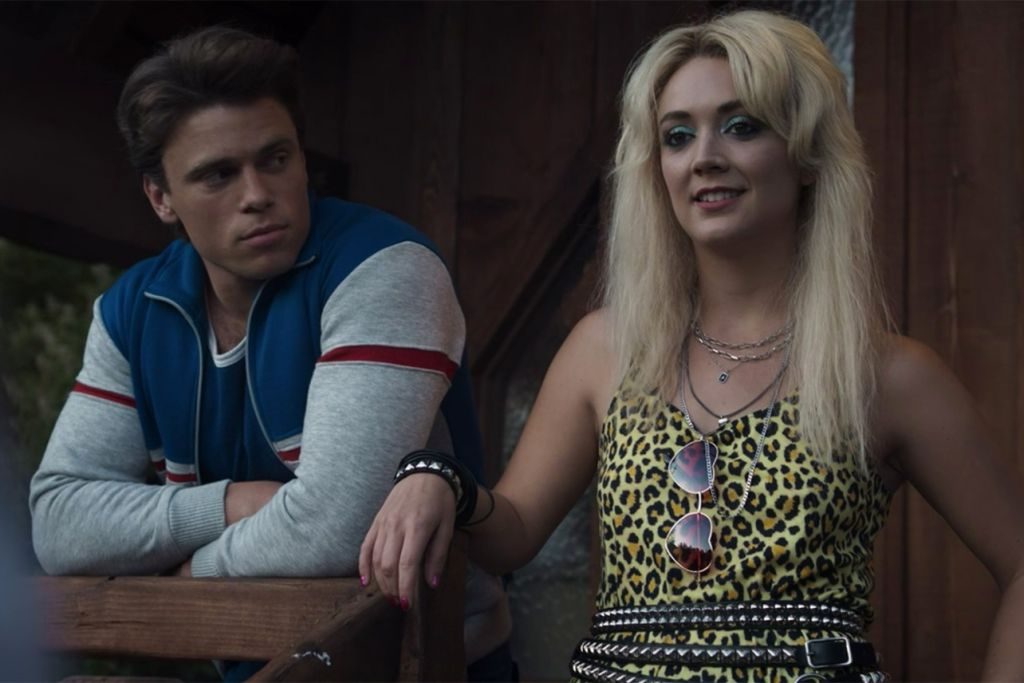Anthology series, by their very nature, are a mixed bag. American Horror Story is the longest-running of these, and thus makes for a perfect case study. The show is at its best when it allows itself to truly go over the top, which is why Asylum (season two) and Roanoke (season six) really stand out, and why Freakshow (season four) is such a drag. 1984, the show’s ninth season, is prepared to go fully over the top, and it’s a blast to watch. One might wonder (cynically) if the retro feel is just due to the success of Stranger Things, but whatever the case, it works. It’s a milieu in which creators Ryan Murphy and Brad Falchuk (as well as episode director Bradley Buecker) can have a lot of fun, paying homage to some of the slasher flicks that no doubt influenced this very show. To wit, the superstructure of 1984 is essentially a riff on Friday the 13th, but unlike that wretched film, there’s a good chance this will actually be good.
It’s admirable how quickly “Camp Redwood” sets things up. We get a cold open in 1970 at the titular camp, where a threesome is interrupted by two of the participants getting stabbed in the head as they make out. By the end of the night, ten camp counselors are dead, minus an ear (those end up on a necklace). The killer – Benjamin Richter, AKA Mr. Jingles – is caught and sent to a mental hospital. Fast forward fourteen years.
Brooke (Emma Roberts) attends an aerobics class, where she meets and quickly ingratiates herself into a group of friends, Montana (Billie Lourd), Xavier (Cody Fern), Chet (Gus Kenworthy), and Ray (DeRon Horton). Through conversation, we learn that they’re all on edge about being in Los Angeles for two reasons: one, the Olympics; and two, the Night Stalker, Richard Ramirez. Xavier convinces everyone but Brooke to join him at Camp Redwood and work as counselors. Brooke needs a bit of a push, which she gets that night.

The Night Stalker himself breaks into Brooke’s cavernous apartment, robs her, then intones, “You’re going to be famous. You’re going to die at the hands of the Night Stalker.” Zach Villa is fine in the role, but it’s Roberts who really sells this scene. Brooke looks panicked, terrified, and it’s only through sheer luck (and proximity to a cast-iron skillet) that she gets out of the situation alive, although not without a promise from Ramirez that he’ll track her down. Beyond telling Brooke that, yeah, it’s a good idea to leave LA, it’s one of the episode’s multiple instances of genuine tension, where you wonder how a character is going to get out of this one. Roberts is top-billed, yes, but it wouldn’t be out of character for this show to kill the biggest name actor in the premiere episode.
Roberts is fantastic in 1984. Brooke is so much less caustic than the roles she’s previously played for Murphy (Coven, Scream Queens), and it gives Roberts a chance to show another side of her as an actor. Brooke might be a bit much on the goody-goody side, but that’s perhaps a feature, not a bug, if we consider the virginal final girl from any number of eighties movies. That notwithstanding, she’s still fun to watch. Granted, other characters get better lines, but the bulk of the emotionality in “Camp Redwood” is on Roberts’ shoulders. As it is, Brooke is a bit underwritten, your basic nice girl whose defining trait is that she’s, well, nice. But again, it’s hard to tell if Murphy and Falchuk are doing that on purpose. Final girls were routinely underwritten in slasher movies, so perhaps that’s what they’re going for here. Regardless, this is the first episode, so we won’t rush to judgment, but Roberts’ performance augurs well.

It’s Billie Lourd, though, who is stealing the show. After suffering through Lourd’s wooden, unwatchable performance in Scream Queens, I was a bit dismayed to see her second-billed. I love being wrong. Lourd is terrific here. She has a droll sense of humor and a refreshing forthrightness. She enlivens the screen whenever she’s on it; luckily she’s on it a lot. The other actors are fine. Kenworthy does an admirable job in his first acting role; Horton and Fern are a bit in the background as of now, but Fern imbues Xavier with an undercurrent of smug menace.
Lots of slasher tropes are present, and used well. First, the group is warned away from Camp Redwood by a surly gas station attendant, in a scene that is almost identical to one in Friday the 13th. There’s a drifter who delivers cryptic warnings (echoes of The Texas Chainsaw Massacre). And, as there must be, there is an escaped mental patient. A lot of 1984 is structured like an urban legend; not one, but two characters tell the story of that horrible night in 1970. All Mr. Jingles needs is a hook on his hand.
About Mr. Jingles: he’s played by John Carroll Lynch, one of the most welcome faces in film or TV. Lynch doesn’t say a word in “Camp Redwood,” and the performance is better for it. Mr. Jingles has to finish what he started at Redwood, because ten people didn’t die in 1970. Only nine did, and the one who lived is running the camp. What I like about Mr. Jingles is that he’s not one of those slow-moving killers. When he’s running after Brooke, there’s a real sense that she might be caught; it’s another of the episode’s “Run!” moments.
I have a feeling this is going to be as fun to write about as it was to watch. “Camp Redwood” is a solid start, with some occasional bumps, but it’s promising nevertheless. So much happens in this episode that I’ve glossed over scenes and even characters. This is the overstuffed, crazy version of American Horror Story that works best.
4/5
A Few Thoughts
- If no one is careful, Matthew Morrison is going to run away with this whole show. He is so much fun as Trevor, and you can tell he’s enjoying the hell out of himself.
- What a terrific, John Carpenter-esque score by Mac Quayle.
- This feels like something of a reboot, given that Roberts and Lourd are the most recognizable faces from Murphy’s usual stable.

